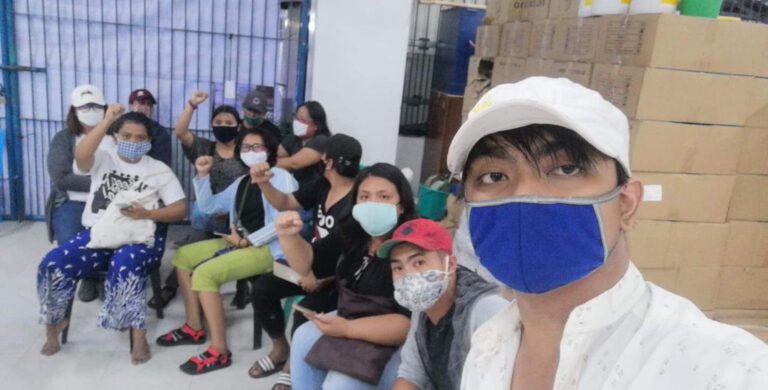“The truth of the matter is that this arrest only proves that the Terror Law was not made to fight terrorism but to stifle democratic dissent.”
By JUSTIN UMALI
Bulatlat.com
CABUYAO, Laguna – Police have still yet to file any formal charges against the 11 Cabuyao activists detained last July 4 after they staged a protest condemning the signing of the Anti-Terrorism Act of 2020 into law.
According to human rights alliance Defend Southern Tagalog, the Cabuyao Police is set to proceed with the inquest on July 6, almost two days after the initial detention.
Eight of the eleven activists are currently detained at the Cabuyao Municipal Police Station. Three of them, all minors, were temporarily released into custody of their guardians but must return the next day to face inquest.
Timeline
The day after Duterte signed the Anti-Terrorism Bill into law, activists and progressive groups nationwide staged indignation protests to condemn the act. The same was true in Cabuyao, Laguna, when progressive organizations took to the streets in protest.
The program began at 5 p.m. and was spearheaded by Bagong Alyansang Makabayan (Bayan) Southern Tagalog. During the program, a truck belonging to the Army’s 2nd Infantry Division was also blaring messages to counter the organizations.
According to eyewitness accounts and the report by Defend ST, the soldiers were red-tagging the protesters, insinuating that they were front organizations of the revolutionary Communist Party of the Philippines.
Defend ST also noted that a negotiating team requested permission from nearby police officers to conduct a program, which was granted to them.
The program lasted 30 minutes. As the protesters were packing up and preparing to leave, combined forces of police and military went out of the barangay hall to apprehend them.
The dispersal was violent and resulted in injuries. A live feed from Bayan Southern Tagalog showed how the 11 were forcibly dragged and pushed towards a police mobile.
One protester, a member of youth group Anakbayan Laguna, was lucky enough to escape. She recounted, “When they started to detain us, I clung to Marife. She told me very calmly to run away. I still think about how she decided to put me before herself.”
Marife Valdeavilla is one of the 11 detained. She is the current secretary-general of Kabataan Partylist Laguna. During the arrests, a soldier stepped on her foot, making her suffer a bruise.
The others also suffered bruises. Miguel Portea, 50, was forcibly pushed to the ground and suffered cuts on his knees and arms. Kyle Salgado, spokesperson for human rights watchdog Karapatan Southern Tagalog, was put on a choke hold and his shirt was forcibly torn during the dispersal.
The 11 were then brought inside the barangay hall before they were transported to the Cabuyao Municipal Police Station in barangay Sala. They were arrested by 6 p.m.
The 11 were held in Cabuyao MPS awaiting a decision from the police. It took five hours before P/Lt. Col. Reycon Garduque arrived at the scene to talk with the protesters’ legal team.
Garduque insisted on pressing charges against the 11, including the three minors. He said that the issue “trended on social media” and as such they could “no longer back down.”
It took a further four hours, 3 a.m., before the 11 were given medicolegal assistance.
The next morning, July 5, the three minors were allowed to be released on condition that they will be summoned the next day for inquest proceedings.
Hopes for dismissal
Defend ST hopes that the next day’s inquest proceedings will result in the dismissal of all charges. Charm Maranan, Defend ST spokesperson, stated that the protesters followed health and safety protocols, were allowed to conduct the program, and caused no disturbance.
“The truth of the matter is that this arrest only proves that the Terror Law was not made to fight terrorism but to stifle democratic dissent,” she said.
Maranan also countered National Security Adviser Hermogenes Esperon’s claims that the Anti-Terrorism Law will not impinge on human rights, pointing to the events that transpired that day.
“Instead of focusing on what’s important – mass testing and fighting COVID-19, Duterte is busying himself with stamping out critics and progressives. Nothing short of shameful on his part,” she said.
“One thing is clear, and it is that the people will not be silenced so easily. Brazen attacks like this will only lead to Duterte’s own downfall.”
The post 24 hours after arrest, still no charges filed vs Cabuyao 11 appeared first on Bulatlat.



